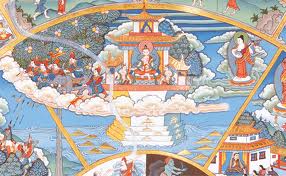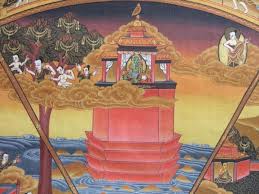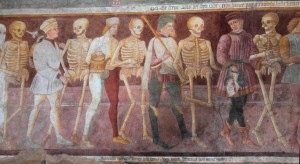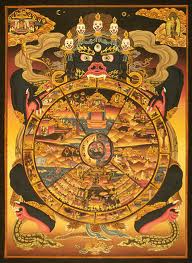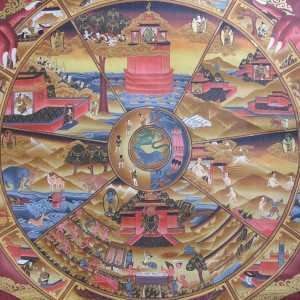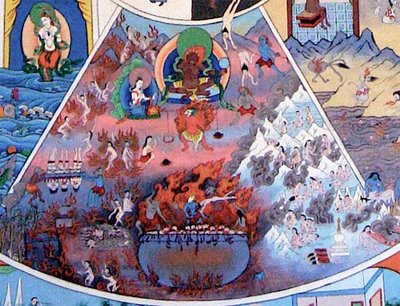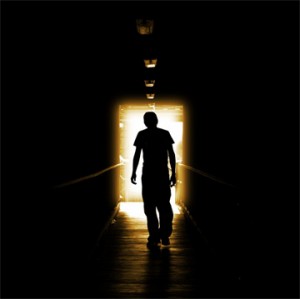The following is an excerpt from a teaching by Jetsunma Ahkon Lhamo offered during a Phowa retreat:
The last of the realms, the highest of the realms, is the one that’s like Club Med. Lots of people say that they want to try this, at least for a little while. I do, certainly. I would like to try this for a little while. I was thinking maybe a couple of weeks, you know, a couple of weeks in the god realm. This place is great. This place is really super. This is the superior realm. In order to be born in the god realm you have to have a lot of merit, but a particular kind of merit. It’s a kind of merit that is not necessarily coupled with wisdom. That is to say, you’ve done a lot of nice things, probably spread out over a long period of time. Or you might have done a few nice things, really nice things, that were just aimed right, like, let’s say, you gave life. Oh, here’s one: Think of the Buddha’s mother. She gave life to a Buddha, but she herself had not attained realization, so she was born in the god realm. She had accumulated a great deal of merit and virtue. So those that are born in the god realm have accumulated a great deal, a tremendous amount, an inconceivable amount, of merit and virtue, but not necessarily coupled with wisdom.
Their experience is beautiful, just beautiful. Breathtaking, in fact. The gods and goddesses of the god realm, of that particular god realm, are beautiful to the degree that if one of them were to walk amongst us now, it would be blinding. We simply could not perceive the sum total of their beauty. It would be out of the realm of possibility with our eyes. Our eyes are of flesh and not made to take in that much beauty. The colors in the god realm are brilliant. Breathtaking. Not like here. Their reds, their blues, their greens are inconceivable to us. Inconceivable to us. Brilliant. Fabulous. In fact, all of the things that exist within the god realm have these kind of interconnected qualities. To only see one of the jewel-like colors of the god realm will instantly cause healing through sight. That’s how perfect they are. Healing through sight only upon seeing a color.
The gods and goddesses themselves are breathtakingly beautiful, I mean to the point where they are just unbelievable, even to each other; and they are adorned with gorgeous colors and beautiful things. Not only that, they also have the quality of extraordinary perfumed scent. Not like our kind of perfume, the kind you buy, phssst, phssst, phssst, phssst, not that kind, alcohol based. Not Esteé Lauder. It’s much better than that. Their scent is the scent of virtue and merit. And so, the fragrance that comes from their bodies… It is said that upon simply smelling one of their bodies, one would receive healing, based on scent. Healing from scent. Their smells are like nothing we can imagine. If we could smell one of them, first of all our noses would not be able to take in all of the scent, and our brains would not be able to process it all. But what we could smell would be so fantastical to us that it would be shocking, like nothing we’ve ever smelled, you see. Furthermore, the level of joy in their minds… Now think about this: What if you were so darn gorgeous that people could hardly look at you? Just think about that. And you smelled so darned good that people just couldn’t get enough of it ?Not only that, but you don’t change. You’re always gorgeous. You don’t have bad hair days in that realm. You don’t have acne in that realm. Nothing changes. You don’t ageuntil the very moment of transition into death. Doesn’t that sound like a great place to go?
Let me tell you a couple of other factors about the god realm. You see how here I have my lemon water and I have my ever-popular coffee? Remember, in the hungry ghost realm I told you that this appearance to a hungry ghost, even though it’s the same thing, it is the same nature, same stuff, to a hungry ghost would appear like a glass of pus, or something horrible. And to a human it would appear like water. You’d say, “Well, that’s what it is. That’s ‘cause we can really perceive.” No, this is Buddha, so we perceive it as water—water to nourish our bodies. However, what would a god or goddess perceive this as? This would be to a god or goddess delicious beyond anything we could conceive of. Furthermore, it would be the nectar or elixir of life. One sip is healing upon taste. Healing upon taste. One taste of this liquid in the god realm will heal every single ill, if there were ills in the god realm. And it’s because of the condition of their minds. Remember, our perception is because of the condition of our minds, not because the object has changed. So everything they eat… And music! There’s music in the god realm that’s nothing like the music you hear here. Not even the best music, not even the finest, most uplifting classical music, nothing like what we have here. The music in the god realm is, again, healing upon hearing, but nothing we can imagine. Celestial. Words don’t explain. So doesn’t that sound like a great place to go? Wouldn’t you love to go there? I definitely feel like we ought to have at least two-week passes. Something, if we knew we could get back in pretty good shape.
Let’s talk about the drawback of the god realm and why you don’t actually want to go to the god realm. Because in the god realm they are so filled with pleasure they can’t practice. If you were to say to a person, “You should practice your Dharma because even your life in the god realm will end. It will, and wait until I tell you how. Your life in the god realm will end.” They wouldn’t be able to hear. They’re so deluded and intoxicated with the product of their virtue that they can’t hear those words and they don’t compute them. They can’t take them in. In the same way that we couldn’t take them in when we were younger and not feeling as though our lives were forfeit, when we believed we were going to live forever, and couldn’t hear about how you have to prepare for death. But much more so. They can’t even compute it; they can’t take it in. It ain’t happenin’ for them. Plus they don’t have the space in their minds to even consider practice. They can’t even stop experiencing pleasure long enough to say Om Mani Padme Hung, which would liberate them from that delusion. They can’t do it; they simply cannot do it.
Now what happens to the hungry ghosts? What is their lifetime? Their lifetimes are very, very long. It’s the same at the high end and the low end of cyclic existence. Generally speaking, their rebirth in the hell realms and hungry ghost realms are quite long. Our lifetime would be like a day in a year of their life. It would be very, very long. It’s different with each of the different realms, but it’s quite long. The same for the god realm. For the god realms, lifetimes can be as much as an eon. Nobody’s real sure how much an eon is. People keep asking me; I don’t know. Tibetans have one idea, westerners have another idea. It’s a long time. Trust me on this. So the gods and goddesses can live in that realm for eons. Eons. There are many stories of the different gods and goddesses that have lifespans of two kalpas, or two thousand years. There are many stories like that. And then, upon their death, another one takes their place in the very same form, and none of us realize that gods and goddesses are in fact dying and being reborn. We think they live forever.
Here’s how it works. Once again, it takes a tremendous amount of virtue and meritto be reborn in that god realm. So what happens is during the course of their lives they are burning that merit and virtue up, much like an eight cylinder car going up hill. Remember what those guys were like? You burn a lot of gas. And so they are literally burning merit, because their lives are so pleasurable. They’re spending it like money. Just buying everything, you see. If you were spending your money on a poorer life, or spending your merit on a poorer life there wouldn’t be so much expended, but they’re spending their merit on this extremely pleasurable life. And there is a continual outpouring of one’s merit, or using up of one’s merit.
So what literally happens is that at the end of this span, when one’s merit and virtue is completely exhausted, then suddenly the gods and goddesses begin to wake up from their pleasure experiences, as though waking up from an erotic dream, or an extremely pleasurable dream. And suddenly you find yourself in your own bed and you’re wondering what’s going on here. That kind of thing. The gods and goddesses have the same experience: Suddenly they are shaken and they look around and they see. And at that time they are not only able to see all of the god realms, which they do have the power to do, but they are also able to see down toward the other five realms. And then, when they have already used up everything they’ve got, they finally see that they have used up all their virtue and merit, and that they are about to fall into the lower realms. The only time that they are able to see that is right at the time of death. And it’s because their using up all of their virtue and merit gives them that moment, that pause, that removal from the drunkenness of pleasure, to where they can see.
Suddenly all the other gods and goddesses move away from the one who is having that experience. Here’s why. Suddenly they are not so beautiful. Their beauty begins to decay in the same way our beauty begins to decay as we age. Their beauty begins to decay and their smell begins to change. We don’t notice, but here, as physical beings, we carry the scent of death with us always. We do. We carry with us that scent, because our bodies are in process; and there’s always some part of our body that is living and dying in cycles. That is not true of the god realm. What happens is suddenly at that moment when the merit is used up, the smell of death can be detected. And all of the other gods and goddesses who do not have the capacity to register that distress because they’re still drunk with the pleasure realm move away. They simply can’t see you anymore. And not only does the poor sentient being realize what they are about to experience but they also realize that they are also utterly and completely alone, and that is a grave and great suffering for them. They are abandoned. And then they do fall. At that time they have no virtue and merit left to cash in, because they’ve used it up in the god realms, and their experience for a period of time after that is quite negative.
So this is why we do not wish to be reborn in the god realms. Even though it would be great to take a vacation there—I’m ready, we could go right now—still, you do not want to be reborn there. And it is better to think in a realistic way. If you were to think, “Oh, I would like to have a vacation right now, I would like to go to the beach,” but you knew for sure that going to the beach would end your opportunity, or would cause you to suffer greatly later on, you would be smarter to choose not to go to the beach, even though you want to go. So it’s like that. The only realm worth aspiring to is the realm of human rebirth, because it is only uniquely in human rebirth that we can practice Dharma. And it is only uniquely in the human rebirth that we can aspire to and look forward to being able to benefit sentient beings.
These, in a nutshell, are the sufferings of cyclic existence. Now this teaching that I have given you is brief and concise, and it fits in the category of Ngöndro or preliminary teachings: preparation for the mind, or turning the mind toward Dharma. It is not directly connected with Phowa, even though we are speaking about life and death and the experiences therein. At this moment we are speaking of the bardo of life, and this is the experience of the bardo of life as experienced by the many different kinds of sentient beings that are revolving in cyclic existence. Having understood their suffering, can you feel compassion for them?
Copyright © Jetsunma Ahkon Norbu Lhamo All rights reserved
